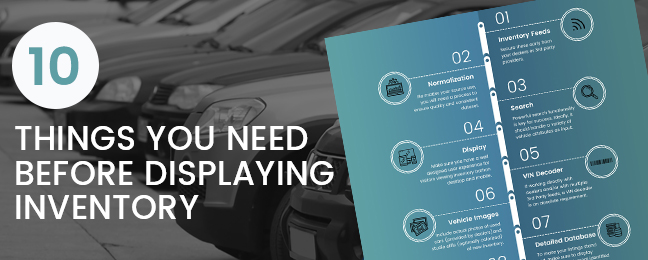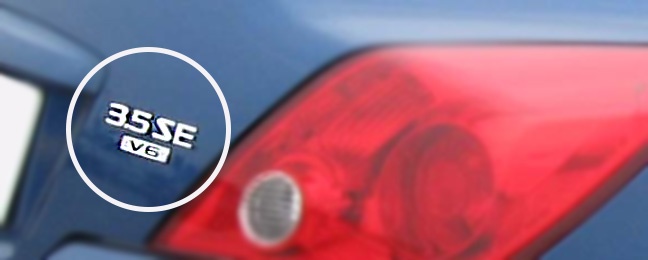Thinking about trying your hand at creating the next great inventory listing portal? Make sure your plan for displaying inventory has all your bases covered by checking out our infographic!
Read MoreSep 19 2014
Topics: Auto Portals, VIN, Vehicle Equipment
Mar 7 2014
Motorcycles offer a great deal of joy and freedom for their riders. However, riding a motorcycle carries with it risks, so most serious riders desire good insurance coverage. For convenience and the best policy rates, many riders go online for quotes on motorcycle insurance. There is plenty of competition out there among websites offering these types of quotes. If your company provides motorcycle insurance quotes, you need a way to stand out from the crowd.
Apr 9 2013
Online quotes have revolutionized the world of car insurance, by providing multiple quotes, quickly, from different carriers. This has created an environment where consumers shop around for the lowest premium possible and may do so as frequently as once or twice a year. As a result, there is a consistent demand for online quoting, both from the insurers directly as well as from third party sites that provide quote comparison tools, and an increase in competition.
Topics: Auto Portals, Automotive Data, Vehicle, VIN, Insurance, Auto Manufacturers
Mar 8 2013
VIN Decoding Large Commercial Vehicles
The medium-duty and heavy-duty truck segments offer unique challenges to VIN decode properly. Almost all commercial trucks offer many options to significantly customize and up-fit the vehicle. These options and up-fits include everything from engines and transmissions to axles, cab types and body types, all of which can substantially change the details and specifications of the vehicle. (For more information on the challenges of decoding large trucks see our article “VIN Decoding Outside the Light-Duty Segment”.) The customized nature and complexity of these vehicle segments has contributed to their being few commercial VIN Decoding solutions available for large trucks.
Read MoreTopics: VIN
Jan 23 2013
Never before have there been more ways for auto dealers to market inventory to customers - who are able to take advantage of unprecedented availability of vehicle data and methods of comparison shopping.
Topics: Automotive Data, Marketing, VIN, Safety, Vehicle Valuations
Jan 18 2013
Like an individual fingerprint unique to each person, the Vehicle Identification Number is unique to each individual vehicle. And just like the federal government maintains a database of fingerprints in order to access information on individuals registered in the system quickly and accurately, a VIN database can also access a wealth of information on each vehicle in the system in a quick, organized, and easy manner.
Read MoreTopics: Logistics, Automotive Data, Vehicle, VIN
Dec 19 2012
Since 1981 the global vehicle manufacturing community has used the 17 digit VIN as a means to uniquely identify a vehicle. The VIN captures basic vehicle information as part of an international standard, and in some countries, like the US, it is used to capture additional data. In the US, the National Highway Traffic Safety Administration, or NHTSA, is tasked with regulating the information the VIN must capture, how it is assigned and to whom. Some of the many benefits of the VIN system include being able to identify and recall vehicles with safety issues, track vehicle's accident and maintenance history, and identify vehicles that have been stolen.
Topics: Automotive Data, VIN, Safety, Powersports
Aug 10 2012
In our VIN Decoding 101 series of articles, we have focused on which vehicles are required to have 17-digit VIN numbers assigned and what data is and is not captured within the VIN. We have seen that country of sale, vehicle segment and type, model year, and manufacturer all play a big role in the usefulness of VIN decoding and the type and depth of vehicle details the VIN will encode. For many applications, a basic VIN decode, one that decodes only what is encoded in the VIN, will provide all the details that your business needs. However, there are also many common VIN decoder applications where there is a need and substantial benefits for more detail, as much as possible. How can this need be met?
Topics: VIN
Jul 20 2012
Since 2006, California has maintained legislature to ban driving and texting. The penalties for being caught texting or otherwise touching or using your phone while driving are steep.
Topics: Vehicle, VIN, Safety, Auto Manufacturers, Automotive
Feb 24 2012
As we explained in our article "VIN-to-Trim/Style Matching Explained", VINs often are not encoded with enough information to determine a single vehicle style. This means that important details such as MSRP, MPG, and certain standard installed equipment may not known based on the VIN alone. If you're working with DMS data, there's a good chance that you have additional, valuable data at your disposal that you can use along with the VIN to decode down to a single vehicle style.
Topics: Automotive Data, VIN










